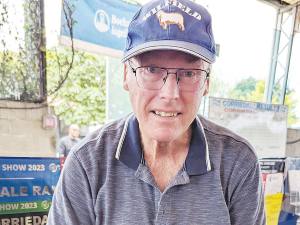Fonterra opens organic milk supply to South Island dairy farmers
South Island dairy farmers will soon be able to supply organic milk to Fonterra.
 Corriedale breeder Robin Wilson shows the depth and quality of fleece of one of his winning entries at the 2023 NZ Agricultural Show. Photo Credit: Nigel Malthus
Corriedale breeder Robin Wilson shows the depth and quality of fleece of one of his winning entries at the 2023 NZ Agricultural Show. Photo Credit: Nigel Malthus
Successfully breeding what they call their "Corriedale 2.0" sheep is paying dividends for Robin and Pip Wilson of Wilfield Stud, West Melton.
Rural News caught up with Robin Wilson at last year's NZ Agricultural Show in Christchurch, where his animals won a slew of ribbons.
The Wilsons established Wilfield in 1992. Rather than chase the vagaries of the market with specialist wool or meat animals, they went with Corriedale as a good dual purpose breed. They have aimed to improve their flock towards a finer fleece while maintaining carcass quality.
Wilson says some of his show animals carried wool of only 24 or 25 microns, albeit not as fine as the 18 to 20 micron wool from a Merino.
"But you get a better carcass with these sheep with more meat on them," he explains. "And the quality of the meat is highly valued. The market pays a premium for it because of the intramuscular fat and the colour and the tenderness of the meat."
Wilson believes they have succeeded in breeding what they call "Corriedale 2.0", their version of a "more modern" Corriedale. He says their sheep have a more open face, better fertility, finer wool, better mothering ability and are more footrot resistant.
"We've made great progress in the last few years and we've had lots of compliment about what we're doing," Wilson adds. "Generally, in the sheep industry, it's very hard to put fine wools on a good-carcased animal. I think we've been able to do that."
The Wilsons use traditional breeding practices of good stockmanship with modern technilogies of objective measurement and analysis (Sheep Improvement Ltd) and gene marker technology (footrot, extra muscling, cold tolerance and worm resistance) to identify the most productive and profitable animals for meat and wool production.
Meanwhile, Wilson agrees that farming is difficult at the moment with all farmers struggling with low commodity prices, higher interest rates and higher input costs.
"So, what farmers do is just batten down the hatches and they don't spend any money. They're in survival mode," he says.
It's been going on for about a year now and appears likely to continue.
"It'll be a year or two more. That will be a real challenge. And if El Nino kicks in, which it is forecast to do, but hasn't yet, then it'll be a real challenge for most pastoral farmers."
But Wilson says he is realistic rather than pessimistic.
Recent weather events in the Bay of Plenty, Gisborne/Tairawhiti, and Canterbury have been declared a medium-scale adverse event.
DairyNZ's chief executive Campbell Parker says the 2024/25 dairy season reinforces the importance of the dairy sector to New Zealand.
A New Zealand agribusiness helping to turn a long-standing animal welfare and waste issue into a high-value protein stream has won the Australian dairy sector's top innovator award.
OPINION: A bumper season all around.
Dairy Women's Network (DWN) has announced that Taranaki dairy farmer Nicola Bryant will join its Trust Board as an Associate Trustee.
Rural Women New Zealand (RWNZ) says it welcomes the release of a new report into pay equity.

OPINION: A mate of yours truly reckons rural Manawatu families are the latest to suffer under what he calls the…
OPINION: If old Winston Peters thinks building trade relations with new nations, such as India, isn't a necessary investment in…